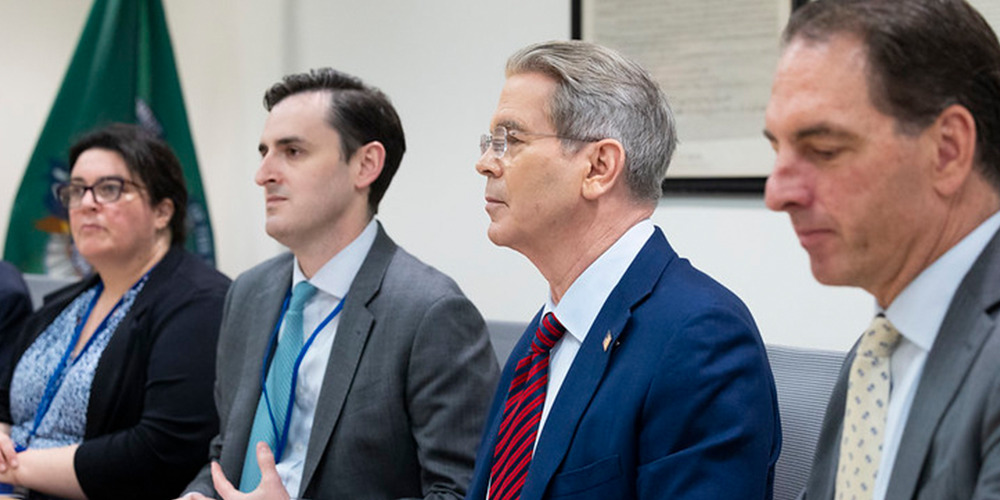The US Treasury is one of America’s most venerated institutions and all eyes were on Scott Bessent as he assumed the department’s reins in late January.
Bessent must support the president’s programme. He signed up knowing Donald Trump’s worldview and what he was getting into. In carrying out the administration’s duties, Bessent’s hand is widely evident.
The Treasury secretary has broad duties in support of growth, sound economic policies and the dollar. He must manage public debt, smoothly run the Treasury’s many parts and act as the administration’s chief economic spokesperson.
Growth, sound policies and the dollar
Bessent is known for arguing US growth will sustainably rise to 3%. While this is a noble aspiration, the Congressional Budget Office, the Federal Reserve and most forecasters put potential growth at around 2%. Further, the US is now headed towards a significant slowdown due to the president’s chaotic tariff policies and uncertainties, which have put even 2% growth well out of reach for now.
Bessent by necessity publicly defends Trump’s trade policy. He recently won plaudits for quietly urging Trump to abandon ‘reciprocal’ tariffs. While equity and bond market collapses may have then motivated Trump, whatever role Bessent is playing in moderating the president’s destructive trade views is most welcome. He’s now tasked with negotiating trade deals. One wishes him well. But the situation remains a mess.
These policies – plus Trump’s attacks on the Fed, rule of law and allies, and Council of Economic Advisors Chair Stephen Miran’s writings about coercive capital market measures – have undermined trust in America, helping lead to volatile market developments and global portfolio reallocation from the dollar. They call into question America’s commitment to defending the properties that underpin dollar dominance. Bessent helpfully may have tried to soften Trump’s wrongheaded attacks on Fed Chair Jerome Powell, an outstanding and conscientious public servant whose only sin has been to provide cogent analysis and speak truth to power.
The secretary is America’s chief international financial diplomat. Bessent’s recent speech highlighting US commitment to remain in the International Monetary Fund and World Bank, while pursuing reforms, was welcome. So was his trip to Buenos Aires showing support for President Javier Milei’s reform programme, backed by the IMF. Bessent was the first administration official to visit Ukraine, seeking half of the country’s mineral revenues as payment to the US; a proposal that was tantamount to a shameful US shakedown.
Managing public debt
Bessent has postulated that revenues would gush on the back of 3% growth, helping bring the US fiscal deficit to 3% of gross domestic product. He is wrong in arguing that America doesn’t have a revenue problem.
The CBO projects annual deficits of 6% of GDP for the coming decade, assuming the 2017 Trump tax cuts expire. Those cuts are likely to be extended, further pushing up US debt and deficits. Bessent’s response in the face of the CBO’s reminder that the US fiscal trajectory is unsustainable was to blast the CBO. Bessent may purportedly be a fiscal hawk, but that does not change the laws of arithmetic.
Smoothly running the Treasury
Bessent has disregarded critical institutional prerogatives.
The Internal Revenue Service’s stewardship has been calamitous. The IRS has gone through acting commissioners and senior official resignations faster than one can hit a computer’s refresh button, mainly because of Department of Government Efficiency efforts to access the taxpayer database and IRS concerns about upholding US law. Bessent’s agreement to facilitate deportations by sharing immigrants’ tax data with homeland security authorities – which many legal analysts believe violates privacy laws – may cost the IRS some $300bn in lost revenue over the next decade. Severe DOGE-inspired IRS staff cuts could contribute to revenue losses of $500bn this year, largely through reduced enforcement.
It beggars the imagination how crippling the IRS in the face of massive fiscal deficits will not further hinder keeping the budget in check.
One of Bessent’s first acts was to do little amid the resignation of the apolitical and outstanding technical civil servant who oversaw the US Treasury’s payments system – America’s chequebook, paying the bills Congress and the Executive Branch mandated – amid seriously concerning DOGE infringements.
Bessent’s Treasury suspended enforcement of the Corporate Transparency Act aimed at tackling money laundering, tax evasion, terrorist financing and shell corporations. The administration champions cryptocurrency, despite its use in criminality, terrorist financing and money laundering, which major parts of the Treasury exist to fight.
Administration’s chief economic spokesperson
The Treasury secretary, the administration’s chief economic spokesperson, should command respect and inspire American and global confidence.
That is not the case. Bessent strains credulity with arguments about disregarding market volatility because the US economy needs to go through a detox period. He has contended that China will pay for the tariffs, said ‘so what’ if China raises its tariffs, suggested Americans should not worry about day-to-day fluctuations in 401Ks when stocks are tanking, applauded falling 10-year yields when the declines were a product of recession fears gripping markets and claimed Trump’s tariff backtracking was the strategy all along.
Past administrations practiced verbal discipline with only the secretary speaking about markets. Team Trump lacks discipline. Comments from Peter Navarro, Howard Lutnick, Stephen Miran and Kevin Hassett have impacted financial markets and sown confusion. Of course, Trump won’t restrain himself and Bessent can do little about that.
Bessent at times may play a helpful behind the scenes role in limiting fallout from the administration’s policies. But critical disappointments are evident. After 100 days, the record is less than lustrous.
Mark Sobel is US Chair of OMFIF.
Join OMFIF on 24 June for the launch of Global Public Investor 2025.
Image credit: HM Treasury
Interested in this topic? Subscribe to OMFIF’s newsletter for more.

